While eating dinner in front of the television isn’t something we recommend every night, sometimes a change of pace can help promote more fun, conversation and connection than the same old routine! That’s why we’ve launched our Dinner and a Movie feature. We’re teaming up with our friends at Common Sense Media to choose family-friendly movies that can help you promote character building while enjoying some fun time together. When you pair them with our suggestions for food, fun and conversation, you can have a memorable Dinner and a Movie experience that turns screen time into family bonding time that everyone will look forward to.

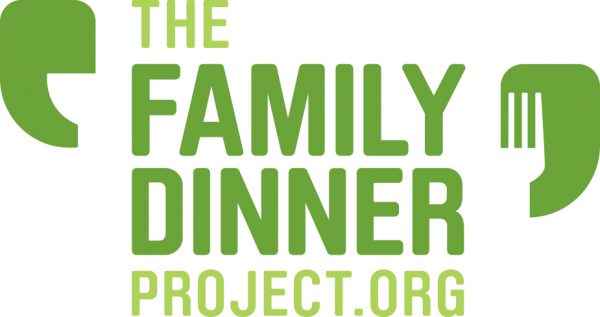
March is Women’s History Month, and a great opportunity to spend some family time learning more about inspiring female role models. We’ve got family film recommendations from our friends at Common Sense Media that share the stories of real girls and women from around the world. Some are famous for their contributions to history; others have made a big impact on the arts, agriculture or education, but might be new to you. Enjoy learning about them through these Dinner and a Movie ideas combining food, fun, and conversation in celebration of Women’s History month.

Movie Recommendations from The Family Dinner Project and Common Sense Media:
A Ballerina’s Tale (ages 9+)
Girl Rising (ages 12+)
He Named Me Malala (ages 12+)
Suffragette (ages 13+)
Temple Grandin (ages 14+)
Food
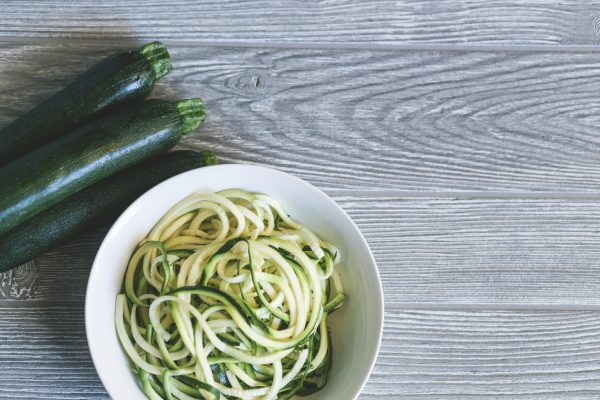
Explore recipes from some of the strong female role models featured in these films! Ballerina Misty Copeland likes to make Zoodles Primavera to pack extra vegetables into her meals, and using a spiralizer to turn zucchini into noodles is a fun kitchen activity for kids. Or you could honor Malala Yousafzai by making the meal she ate before she was injured by the Taliban — a breakfast of Chapatis and Fried Eggs. And there’s always the possibility that your family would enjoy cooking and eating like a suffragette! “Rebel Soup” is just one of the historical recipes you might try from the real Suffragette’s Cookbook, originally published in 1886.
Fun

Test your women’s history knowledge this month with some fun dinner games. You could play “Celebrity,” adding the requirement that every name given is the name of a female role model from history. Put the names of historical women you admire into a bowl or jar in the middle of the dining table and take turns describing them in the “Salad Bowl Game.” Or bring some women’s history trivia questions to dinner, like these quiz questions from Read Brightly.
Conversation
Women’s History Month provides an opportunity for families to talk about our society’s changing views on gender roles. Try some of our conversation starters about gender roles, like “What kind of messages do you receive about your gender from popular culture?” You can add onto the discussion with film-specific conversation starters suggested by our friends at Common Sense Media.
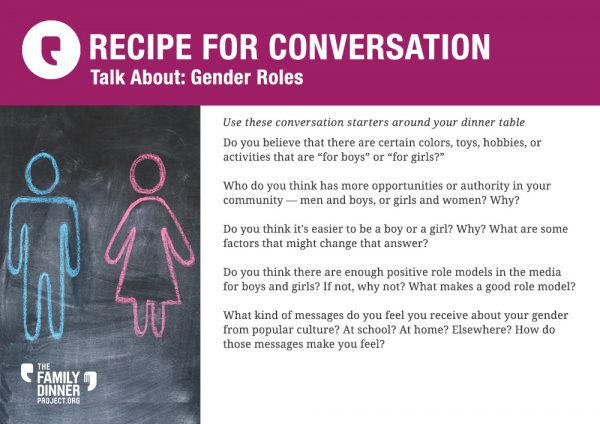
- Much of A Ballerina’s Tale focuses on Copeland’s groundbreaking rise at American Ballet Theater.
 Why do you think there have been so few African-American ballet dancers? Is ballet unique in this way, or are race relations in the fine arts similar to the rest of the world?
Why do you think there have been so few African-American ballet dancers? Is ballet unique in this way, or are race relations in the fine arts similar to the rest of the world? - How do Copeland’s experiences compare with those of some of her predecessors — the other African-American ballet dancers of years past who never made it as far as she did? What makes her a role model? Is it just that she’s succeeded, or is there more to it?
- In what ways does A Ballerina’s Tale promote integrity and perseverance? Why are these important character strengths?
 If You’re Watching Girl Rising:
If You’re Watching Girl Rising:
- Talk about the importance of empowering girls and recognizing that girls/women should have the same rights as boys/men. What does Girl Rising teach us about the way girls are raised in other countries?
- Which girl’s story most impacted you? What opportunities do you, or the girls in your life, have that these girls have to hope and fight for?
- How can you help spread the word that all girls deserve the opportunity to be educated, equal to boys?
If You’re Watching He Named Me Malala:
- If you already knew something about Malala Yousafzai before watching the movie, did the film help you get to know her in a different way? Do you think that new information was important to understanding what makes her a role model?
- How does the movie make you feel about school and education? Do you appreciate having access to teachers, schoolbooks, and other learning materials? How does it make you feel to realize so many kids have few or none of these things?
- What role do the movie’s animated paintings play in Malala’s story?
- Talk to your kids about what’s happening in the world and how Malala’s shooting is more than just a crime. Ask them whether the film helps explain what happened — and why? What questions do they still have?
You can also use these conversation starters about Malala’s life, developed by The Family Dinner Project and The Malala Fund.
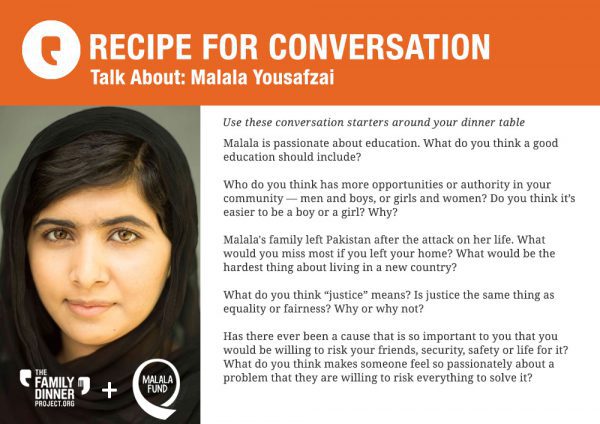
If You’re Watching Suffragette:
- Do you agree with the characters that militant “civil disobedience” had become their only option?
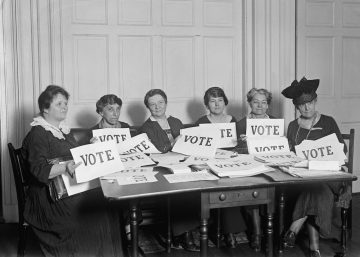 Does that mean their tactics would be effective for other groups fighting for a cause?
Does that mean their tactics would be effective for other groups fighting for a cause? - How does historical perspective frame the way we look at their actions today? Do you agree with Maude’s choices? What about those of her friends?
- How were their lives different than those of women in other social classes? What do you think you’d have done in their place?
- What did the movie teach you about what it was like to be a woman in the early 1900s? How did gender roles define women’s lives? What do today’s mothers, wives, daughters, and sisters have in common with the suffragettes, and how are things different?
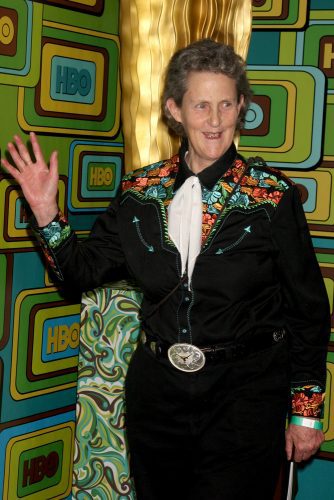 If You’re Watching Temple Grandin:
If You’re Watching Temple Grandin:
- Talk about what Temple Grandin teaches us about neurodivergent people and people with special needs. Is there anything you learned that might make you more sensitive when in their company?
- How does the movie show Temple’s special bond with animals?
- Temple made a big difference in the world. Can you think of others who were able to affect positive change despite obstacles — in life or in the movies? Do you know anyone in your own world who makes a difference?
- Did watching Temple Grandin change your perspective on autism spectrum disorders? What questions did it raise for you, or what would you like to know more about after seeing the film?
Did you enjoy your Dinner and a Movie experience? Check out our other Dinner and a Movie themes, and look for more ideas coming soon!
